Columns
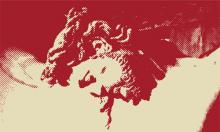
ORTHODOXY AND orthopraxy—strange theological words from Sojourners’ past. But I was recently thinking back to the theology with which Sojourners began—43 years ago—and how it is still so central and fundamental to me today.
I remember the word that we so often used back in our formative days: “and.” As young Christians, we said our fledgling little movement was committed to evangelism and social justice, prayer and peacemaking, spirituality and politics, personal and public transformation, contemplation and activism, real salvation and real social change, orthodoxy and orthopraxy—which means starting with a biblical and Christ-centered personal faith and then living and practicing that faith in the world—in ways that changed both our own lives and public life. “And” was our big word in a church that was so divided and polarized. Another way we expressed it was calling for a “third way” beyond conservative and liberal, evangelical and mainline.
I want to refer back to some of the earliest expressions of our critique of both the conservative and liberal theologies of the time. Please forgive some of the passionate and movement language from the later 1960s and early ’70s (and the generic “male” language), but this was written when I was 23, in 1971! Yet the heart of the editorial commitment expressed so long ago remains true of Sojourners today:
We contend that the new vision that is necessary is to be found in radical Christian faith that is grounded in commitment to Jesus Christ. ... The offense of established religion is the proclamation and practice of a caricature of Christianity so enculturated, domesticated, and lifeless that our generation easily and naturally rejects it as ethically insensitive, hypocritical, and irrelevant to the needs of our times.

WITH THE CRUCIAL midterm elections less than a fortnight past, many Americans are wondering what “fortnight” means, because it sounds really cool on Downton Abbey. Well, it means two weeks, and that’s hardly enough time to develop the regret appropriate to the choices you made at the polls.
But why wait for that inevitable sinking feeling about your latest destructive act against democracy? Let’s get a jump start on your anxiety by reading through a recent poll asking Americans how Jesus would weigh in on issues of the day.
Let the disappointment begin.
As a devout Christian—you can put down your American flag, we know who you are—you regularly ask yourself, “What would Jesus do?” And who better to advise you than Jesus himself, or the best representation of God’s son that modern technology can provide: the telephone survey.
You know, that thing that happens when you’ve just sat down to eat dinner after already getting up twice, once for the cracked pepper you forgot and again to replace the bent fork that you always seem to end up with. Then you finally start to say grace AND THE DARN PHONE RINGS!! (Jesus calls us to follow him. The survey guy calls us at dinner time.)
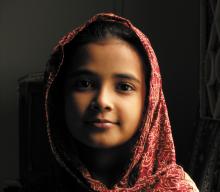
LAST YEAR, as I was unpacking my son’s school backpack, I found the children’s book on the Prophet Muhammad that my wife and I read to him at night. He had brought it to school without telling us. “It was for show and tell,” he explained to me.
You might think that my first reaction would be happiness. One of my goals as a Muslim parent is to help my kids feel connected to their faith. Clearly my son felt close enough to his religion to bring a book on the Prophet to share with his class.
What I actually felt was a shock of fear shoot down my spine. It was an immediate, visceral reaction. A whole slew of questions raced through my head. What did his teacher think of Muslims? What about his classmates? Would somebody say something ugly or bigoted about Islam during my son’s presentation? Would his first taste of Islamophobia come at the age of 5 during show-and-tell?
My fear at that moment is one small window into what it feels like to be a Muslim-American parent at a time when Muslim extremism is on prominent display and Islamophobia in America continues to spread.

LIKE MUCH OF the world, I’ve been thinking quite a bit about ISIS over the past few months. I’ve been horrified by the accounts of the so-called Islamic State’s barbarism, and I lament their perversion of one of the world’s great religions.
Most of all, I’m outraged at their disregard for human life—at their wanton killing of Shia Muslims, Christians, Yazidis, and anyone else who doesn’t share their radical vision. Pope Francis has said that it’s legitimate to act to protect innocent lives in this case, and I don’t disagree with him.
Yet I believe that Jesus calls us to be peacemakers, which requires us to think beyond short-term military solutions and address the systemic issues that breed crises like this one. And I strongly believe that to have any moral authority in the current crisis, we must first confess the Western policies and attitudes that have contributed to where we find ourselves today—and then repent of those policies and attitudes.
The first thing we need to confess is a shallow and, at best, incomplete understanding of ISIS. Alireza Doostdar of the University of Chicago Divinity School wrote, “[We] seem to assume that ISIS ... has suddenly materialized out of the thin ether of an evil doctrine. But ISIS emerged from the fires of war, occupation, killing, torture, and disenfranchisement. It did not need to sell its doctrine to win recruits. It needed above all to prove itself effective against its foes.”
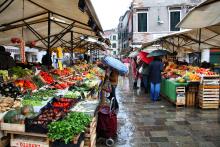
IT'S REASONABLY clear to me that the natural tendency of our society at this moment is toward smallness, localness, and intimacy. After several centuries of constantly extending our supply lines around the world so that our food and our energy and our capital came from every corner of the planet, we find it increasingly pleasing and increasingly necessary to hunker down.
Local food is the best example. Our best restaurants and our sharpest cooks are no longer concerned with copying French recipes; for a generation now it’s been all about what’s close to home. Farmers’ markets have been the fastest growing part of our food economy, and suddenly there are more breweries than there were before Prohibition. It tastes good; it feels neighborly.
Next on the agenda: local energy. All of a sudden it seems weird to be piping stuff in from Saudi Arabia, or even Texas, when there’s plenty of good sunshine to be had close to home, when the wind blows over your house more days than not. In the wake of the financial crisis, there’s even a move toward Slow Money and local banking. It’s possible to imagine how it might all fit together into something quite beautiful—a new/old world that actually kind of works, instead of the careening one we’re used to.
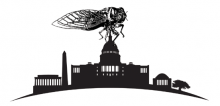
IT’S A LITTLE early to be looking back at the past year, but I have to say I’m very disappointed in 2014. It was supposed to be the Year of the Cicada, a time when millions of fat little bugs would emerge from the ground and loudly buzz around the nation’s capital, possibly joining the chorus to impeach the president. (The cries for impeachment haddeveloped a definite bug-like drone.)
Every 17 years or so, the cicadas are supposed to emerge from the ground where they have been gestating and, for the first week of their debut, bring a welcome distraction to life’s problems. By week two, however, they’ve become life’s problems, striking your head and other body parts as you walk outside, or even inside if you leave the screen door open too long for a cat who just ... can’t ... decide.
Fortunately, they all die after a couple weeks, but then venturing out into your backyard sounds like walking on corn flakes, if corn flakes were green and disgusting, and dead.
But none of that happened this year. Instead of the fun and natural wonder of watching bugs freeing themselves from their dark captivity and flying forth into the glorious light of day, we got nada.
No sitting on the front porch watching cicadas celebrating their new world or becoming lunch to passing birds, whichever comes first; no entomological moment of awe; no opportunity to provide learned commentary on nature’s brutal cycle of life to a wide-eyed grandchild. (“So that’s why you should stay in school and not take drugs.”)
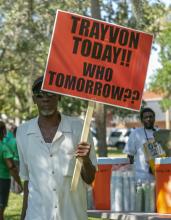
WE HAVE AMPLE reason to weep of late: war in Gaza, crisis in Syria, ISIS in Iraq, the slaying of five unarmed black men in one month at the hands of U.S. police officers, and the demise of congressional immigration reform.
Scripture calls us to cross over into the valley of lament at times such as these. Yet most of us are more comfortable on the plateau of rage or the plain of apathy.
I once led a training on lament and racial reconciliation. Twenty college students sat in the living room of a ministry house as I recited a lament from Jeremiah, the “weeping prophet”: “O that my head were a spring of water, and my eyes a fountain of tears, so that I might weep day and night for the slain of my poor people!” (9:1).
I spoke of the impact of racial injustice in our nation and on our campuses. I recounted slave narratives to the students—stories that had brought me to tears privately. Yet, when the last word was read, the students sat silent with glazed eyes staring back at me.
I didn’t get it. The whippings of human beings, the children separated from their mothers and fathers, the hands, feet, and lives lost in the midst of America’s darkest hours—these things happened. How could we not lament?
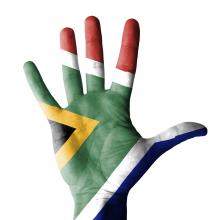
SOUTH AFRICA has meant a lot to Sojourners over the years. In the 1980s, I was invited to come to South Africa by key church leaders there, including Beyers Naudé, the first white minister defrocked by the Dutch Reformed Church for opposing apartheid; Desmond Tutu, the Anglican archbishop of Cape Town; theologian and preacher Alan Boesak; and Frank Chikane, a Pentecostal minister who came up through the ranks of the movement to lead the South African Council of Churches.
They became my “comrades,” as they say in South Africa, for six weeks that happened to fall during Lent—it was a powerful season for me of seeing and feeling the pain of that beloved country while looking for the hope that comes from people who make costly commitments. Together we worked on a strategy between South African and U.S. church leaders to end apartheid.
Ten years later I returned to witness the victory of that hope in the miracle of Nelson Mandela’s inauguration as South Africa’s first black president, and later came back for an international reunion of anti-apartheid activists. Those formative years in the South African movement for freedom helped give me my theology of hope—which I learned means believing in spite of the evidence and watching the evidence change.

WHEN MARK TWAIN supposedly said “reports of my death have been greatly exaggerated,” he didn’t know he was establishing a tweet for the ages. (He didn’t use Twitter. He was more of an Instagram guy.) It still stands as the best rejoinder to those who insist on seeing things for what they aren’t.
Politically speaking, pundits and legislators alike were guilty of prematurely identifying the cold carcass of the tea party last spring when establishment Republicans defeated their right-wing rivals in several primaries. Then came Eric Cantor who, as a Jew, never really fit the profile of an evangelical Christian, the preferred qualification for tea party membership. But as majority leader of the House, he was powerful and occasionally clear-spoken, two other characteristics not often found in tea party favorites.
Nonetheless, Cantor went down to defeat at the hands of an underfunded college professor whose only apparent advantage was a more-evangelical hair style. But his secret weapon was his intolerance for undocumented workers, a favorite position for tea party Americans whose food is harvested almost exclusively by undocumented workers. But let’s not quibble. People are entitled to their opinions, even if the food on their plates sits in mute repudiation of those beliefs. (Luke said “the stones will cry out,” but I’d be happier if a bowl of vegetables would just stand up and say a few cryptic words before dessert.)
So now Eric Cantor’s political career is over, and he moves on to the pitiable life of a wealthy lobbyist who, through no fault of his own, must replace a deep sense of social responsibility with a couple really nice cars. Better that than the consequences for Cantor’s pollster, who predicted a 34 percent victory for his boss. (“Clean-up on aisle 12.”)

A new model of leadership that’s been refined in the fires of change and conflict is emerging from U.S. religious women.
In June, the Institute for Policy Research and Catholic Studies, along with Solidarity with Sisters, invited 150 people to Catholic University for an opportunity to discuss the model of leadership that has developed in Catholic women’s communities around the world over the last 50 years since Vatican II. The event coincided with the release of Spiritual Leadership for Challenging Times, an anthology of 10 addresses given by Leadership Conference of Women Religious (LCWR) presidents.
Catholic sisters are emerging as leaders ahead of their times. From Sister Simone Campbell, SSS, and Nuns on the Bus to Catholic Health Association CEO Sister Carol Keehan, DC, who helped pass the Affordable Care Act, to former LCWR president Sister Pat Farrell, OSF, who practiced authentic spiritual leadership in the face of the Vatican’s ongoing investigation of that organization (an investigation that Pope Francis should have laid quietly to rest, but has not), religious women are getting notice for their thoughtful, faithful leadership in the face of withering criticism and their own communities’ dramatic changes.
What are the marks of this new leadership?

SUMMER IS READNG time and there’s nothing I like more during the warm months than delving into geeky works on religion. This summer, Peter L. Berger and Brian D. McLaren have topped my list.
In a set of recent essays, Berger emphasizes that relativism and fundamentalism are two of the most prominent religious paths in the world today. Here’s my one line definition of fundamentalism: “Being me is based on dominating you.” And my simple definition of relativism: “I no longer know who I am when I encounter you.”
For Berger, while relativism and fundamentalism are at opposite extremes, they are actually closely connected in that they are both “products of the same proc-ess of modernization.” As he first wrote decades ago in his book The Heretical Imperative, frequent and intense encounters between people with different identities is the signature characteristic of the modern era. In Berger’s pithy phrase: modernity pluralizes.
Berger continues, “pluralism relativizes ... both institutionally and in the consciousness of individuals.” In the pre-modern era, institutions, ideas, and identities had a largely taken-for-granted status. For most of human history, the vast majority of humankind had little to no choice about which institutions they were going to participate in or what their identities were going to be. Such matters were experienced as fate.

I'M DREAMING. Ten young men about my son’s age are singing me a Mother’s Day greeting to the tune of “Happy Birthday.” I recognize the melody, of course, but the language is foreign. Still, I’m delighted; I clap and laugh.
Oh, wait. It’s Mother’s Day 2014 and I’m not dreaming. In a refugee camp in Jordan, 10 young Syrian men are singing beautiful Arabic words to me and two other visiting American moms. It’s our last stop in an intense week of refugee visits; it feels good to be laughing.
The singing men, and the young Syrian women who joined us as we toured an educational compound in the Za’atari U.N. refugee camp, were bright university students in Syria before the war—future historians, mathematicians, teachers, agricultural engineers; some just months from graduating—when the violence of Syria’s civil war forced them to flee.
“But when you end up in a refugee camp,” one of the young men explained, “people treat you like idiots. Like you understand nothing.” Herein lies one of the great refugee tragedies. Living at the mercy of others and with little respect, no decision-making freedom, and no control over their future often fuels anger and hopelessness in young refugees.
IN JUNE, SOJOURNERS decided to take part in a little experiment. What would happen if 300 faith and social justice leaders gathered together for a few days to discuss some of the most pressing issues of our time? Our first ever Summit, under the leadership of chief strategy officer Timothy King, had as its tagline: “World Change through Faith and Justice.” Only time will tell how this experiment will play out in the long run, but in the short term I would consider it a great success.
Held over four days in June at Georgetown University in Washington, D.C., the conference brought together 296 leaders from churches, faith-based organizations, NGOs, media outlets, business, and politics. Fifty-three percent of attendees were female, and half were people of color; they were drawn from a wide range of Christian and other religious and spiritual backgrounds.
On the first night, when I saw who was there, I knew the Summit was going to be a powerful and wonderful time. Some participants were local Washingtonians. Others came from as far away as Ethiopia to attend. The group included icons of the social justice movement such as Ron Sider, Marie Dennis, Yvonne Delk, Otis Moss Jr., and Tony Campolo as well as newer leaders such as Otis Moss III, Rachel Marie Stone, and Daniel Varghese, a Georgetown undergraduate who celebrated the Summit’s “radical egalitarianism.” As Timothy King mentioned in our opening session, the group looked a lot like the kingdom of God!

THE RECENT Supreme Court ruling permitting prayer at government functions holds many ramifications for our day-to-day life, such as getting a comfortable seat at the city council meeting before the clerk starts reading the entire book of Revelation.
In writing for the majority, Justice Anthony M. Kennedy held that public prayer is “deeply embedded in the history and tradition of this country” and should be permitted as a ceremonial practice. Like, maybe at the D.C. Department of Motor Vehicles:
Driver: I’m here to renew my driver’s license.
DMV clerk: Let us pray.
Driver: Excuse me?
DMV clerk: With every head bowed, and every eye closed, we pray to the Lord Jesus Christ that his love will pour out on this driver, and by the grace of the Living God, he will always come to a complete stop, when appropriate.
THE NEWS IN mid-May was grim: Scientists announced that melt across the West Antarctic was proceeding much faster than before. In fact, they said that at this point the melt of the six great glaciers fronting Amundsen Bay was “unstoppable,” and that over a number of decades it would raise sea levels by 10 feet or more.
This is another way of saying: Given dominion over the earth, we’ve failed. We’ve taken one after another of the planet’s great physical features and wrecked them. The Arctic? Summer sea ice is reduced by 80 percent, and it’s an every-year affair now to boat through the Northwest Passage, impassably choked by ice until this millennium began. The seven seas? Thirty percent more acidic than they were in the past—and the acidity could double or triple by the end of the century. The Antarctic? It’s not just warming rapidly, but its wind patterns have been changed by the ozone hole in ways that amplify the heating. Storms are stormier, droughts are deeper, fires last longer, rain falls harder.
And all because it was a little easier and a little cheaper not to change off fossil fuels. When scientists sounded the alarm about all this in the late 1980s, the atmospheric concentration of carbon dioxide was about 350 parts per million—or what we now consider the upper bound of safety. If we’d heeded their fervent warnings, we’d have moved with great speed to convert to solar and wind power. We’d have parked our SUVs. We’d have insulated every home in the world. It would have cost money and it would have been inconvenient; on the other hand, it could have bred solidarity in much the same way that preparing for World War II transformed the U.S.

ONE DAY, WHEN I was a student at Christ the King Elementary School in my hometown of Richland, Wash., the nuns gathered all the kids, two by two, and walked us outside to the parking lot. There sat a mobile van emblazoned with the logo of the Atomic Energy Commission and the words “Whole Body Scanner.”
One at a time, we were led into the van, where we laid on a white-sheathed table beneath a large, (scary), medical-looking machine. There was a whirring sound, and after a minute or two we were told to get up and make room for the next child. We weren’t told what the process was for, but it’s safe to assume that the government was interested in the effects of radiation on those of us who were “downwinders” from one of the nation’s largest nuclear complexes.
Richland was (and is) the bedroom community for the Hanford Nuclear Reservation. Hanford was built in the 1940s as part of the Manhattan Project, the massive wartime program that led to the atomic bombs dropped on Hiroshima and Nagasaki at the end of World War II. Hanford’s role was the production of plutonium for the world’s first nuclear weapon, the “test” bomb detonated in New Mexico a few weeks before Hiroshima, and for the bomb that destroyed Nagasaki three days later.
Those weapons were dropped 69 years ago, but the debate about their morality continues. It emerged again this spring when the two Missouri senators proposed renaming D.C.’s Union Station after Harry S. Truman, who authorized history’s only nuclear attack on people. One commenter in a related discussion wrote, “I have a problem with judging past cultures by today's standards. To end WWII we dropped bombs on cities filled with innocent civilians. By today's standards that would be condemned. Are you willing to say we should not have done that to end WWII?”
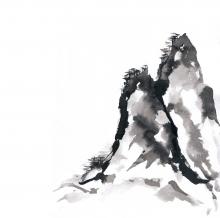
LOVE. THAT'S WHAT moves mountains. That’s what the inimitable Dr. Maya Angelou shared with Oprah Winfrey in an interview a year before Angelou’s passing on May 28, 2014, at the age of 86.
In the days following her death, tributes blanketed the television and internet. Perhaps the greatest came on Sunday evening, June 1, as Oprah Winfrey aired a series of exclusive interviews with Dr. Angelou. Thus, the prophet spoke from the grave and this is what she said: “Love moves mountains.”
Jesus said faith moves mountains—faith the size of a mustard seed (Matthew 17:20). Did Dr. Maya Angelou dare to contradict Jesus? The poet/prophet says love. Jesus said faith. Which is it? Perhaps both.
People of faith know—they have witnessed it. Faith does move mountains. But they also know this: Faith’s power can lay dormant until it’s set ablaze by love. Perhaps only love has the power to fortify faith enough to make the earth quake.
Anger can shake earth, but it cannot move it. Rage can break earth, but it cannot move it. What if faith the size of a mustard seed requires the force of love to move the mountain? If that is the case, we are left with one haunting question: Why have we seen so few mountains move in our lifetime?
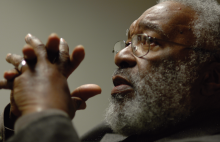
I SAT MY two boys down the night I got the call and heard the news. “Uncle Vincent has died and passed on,” I told 15-year-old Luke and 11-year-old Jack.
I could see the sadness in their faces. Vincent Harding had been like an uncle to them, an elder and mentor to me, a formative retreat leader for the Sojourners community, and one of the most insightful commentators and historians of the true meaning of the civil rights movement and Martin Luther King Jr.
Dr. Harding and Dr. King were friends. Vincent and his wife, Rosemarie, were part of the inner circle of the Southern freedom movement, and Harding wrote the historic speech that King delivered at Riverside Church in New York City on April 4, 1967, where he came out against the war in Vietnam and identified the “giant triplets” of racism, extreme materialism, and militarism.
That speech was perhaps King’s most provocative and prophetic address. It reflected King’s heart and mind, and went further than he had gone before in challenging foundational and systemic wrongs in U.S. life and history and not merely calling for racial integration. This King—particularly in his thinking and writing from 1964 and the passage of the Civil Rights Act until 1968, the year of his assassination—was a King perhaps best understood by his speechwriter that day, Vincent Harding.
That’s what Vincent always did for us all: asked us to go deeper into our faith.

I’VE BEEN SPENDING a lot of time with my credit card company lately. Nice people work there, of course, and I try to make every phone call a time of conviviality and respect. It’s what good people do.
Credit card guy: Sir, my name is Brian, and ...
Me: No, it’s not.
“Brian”: I beg your pardon?
Me: Be honest. They give you anglicized names to sound more American, right? So when did you get that name?
“Brian”: When I was born. It’s also my father’s name.
Me: And, you’re calling from, like, Mumbai or ...
Brian: Texas.
Me: [awkward moment of silent self-loathing, mercifully cut short by seeing a butterfly. Pretty.]
But you readers understand my point. American jobs should be for Americans. Honest, God-fearing Americans who embody the spirit of freedom and entrepreneurship. Like the guy in Kansas who, according to Brian, had just purchased an iPad with my credit card number. Brian was calling from Texas to make sure this was okay with me, which it wasn’t.
Don’t get me wrong. I’m all for buying an iPad or any of the high-tech gadgets that I’ve had my eye on. And I totally get that the guy in Kansas feels the same way. In fact, I was cool with him right up to the point where he decided to keep it for himself.
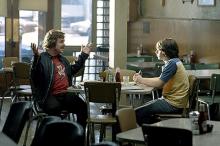
DURING THE WINTER of my sophomore year in high school, a fistfight broke out in the cafeteria. It wasn’t anybody I knew especially well, and it didn’t get very far, but it marked a day in my life I’ll never forget.
Once the commotion started and the chant of “fight, fight, fight” rose up in the lunchroom, everybody stood to cheer and watch. I did too, craning my neck to try to see better, probably wearing a sophomoric smirk on my face. It felt to me as if the whole world had gotten to its feet.
Everybody except one person. I only noticed when it was over and all of us turned to sit back down. My friend JJ hadn’t budged. Judging by the fact that his sandwich was almost gone, he hadn’t even let the matter affect his lunch. He didn’t ask any questions about the fight—not who was involved, not whether there was blood, not who won—he just bit into his apple.
The rest of us tittered on about the whole thing. Who we were rooting for, whether it would continue at the park after school, blah blah blah. JJ just stared off into space.
Finally, the contrast felt too much for me, and I said, “Hey JJ, why didn’t you get up?”
“I don’t like fights,” he responded. Then he looked me straight in the eye and said, “You don’t like fights either.”